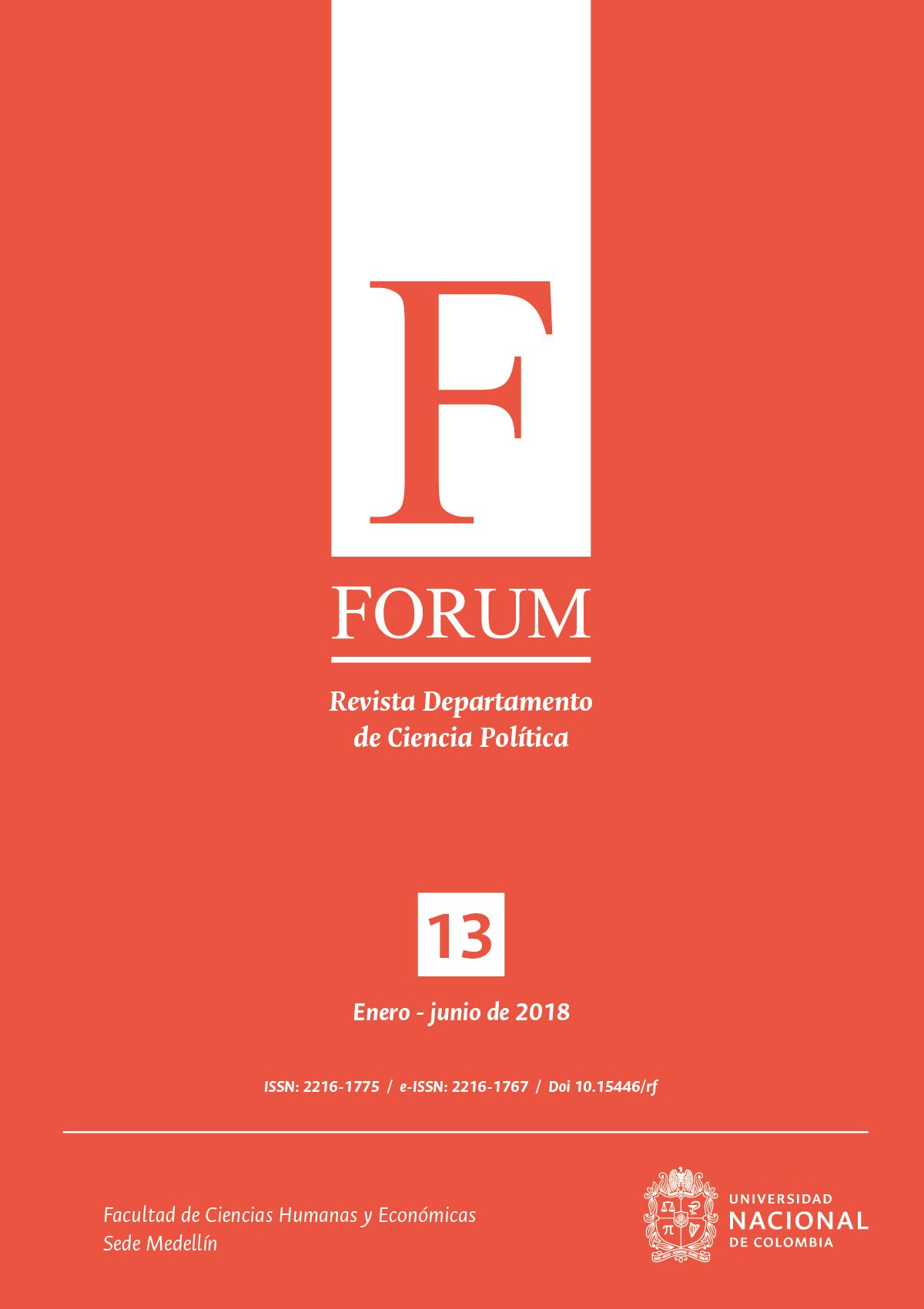Economía política e interdependencia compleja en el sistema de guerra en Siria
The Political Economy and Complex Interdependency of the War System in Syria
DOI:
https://doi.org/10.15446/frdcp.n13.71017Palabras clave:
Economía política, guerra, Siria, violencia (Thesaurus), ISIS (Autor) (es)Political economy, war, Syria, violence (Thesaurus), ISIS (Author) (en)
Descargas
La duración de las guerras civiles ha sido un área de estudio elusiva, particularmente debido a la difícil tarea de dilucidar la interacción entre el agenciamiento de los actores, las estructuras de incentivos y las restricciones a las que se enfrentan dichos actores. Este artículo aborda la guerra civil de Siria, la cual ha completado su quinto año con pocas esperanzas de una pronta finalización. Se examinó aquí una posible causa de su prolongación, a saber, la formación de un sistema de guerra que hizo que los costos de la guerra fueran menores comparados con los riesgos que se esperaban de un acuerdo de paz, dados los costos asumidos por los actores locales, regionales e internacionales. El acercamiento a estos asuntos a través del concepto de sistema de guerra combina un análisis de clase con un análisis de sistema estructural, capturando así los matices y las dinámicas del conflicto. Este artículo se basa, en fuentes primarias recolectadas por el autor durante los veranos de 2014 y 2015 en Líbano.
Duration of civil wars has been an elusive area of study particularly because of the tedious task of disentangling the interplay of actors’ agencies, incentives' structures and constraints. This article tackles Syria’s civil war that has completed its fifth year with little hope for an end any time soon. I examine a plausible cause leading to its protraction. Namely the formation of a war system, which made the costs of war less than the expected risks of peace giving the local, regional and international actors that are shouldering the costs. The war system approach combines class analysis with system-structural analysis capturing nuances and dynamics of conflict. This article is based in part based on primary sources collected by author in the Summers of 2014 and 2015 in Lebanon.
Referencias
Al Mahmoud, M. (18 de junio de 2014). Periodista sirio de Raqqa, comunicación personal, Beirut.
Al-Saadi, S. (02 de junio de 2015). Iran’s Stakes in Syria’s Economy. Carnegie Endowment for International Peace. Recuperado de http://carnegieendowment.org/sada/?fa=60280
Balout, Muhamad. (24 de noviembre de 2015). Souriya: Rouseya Tanshour Dababat T-90 Wal Saudia wa Qatar Tashtariyan Sam 3 Lilmusalihein, Al Safr, p. 12.
Batatu, H. (1999). Syria’s Peasantry, The Descendants of Its Lesser Rural Notables, and Their Politics. Nueva Jersey. Princeton University Press.
Cederman, L. E. (2004). Introduction to Special Issue on Disaggregating Civil War. Journal of Peace Research, 41(3), 243-252.
Collier, P. y Hoeffler, A. (1998). On Economic Causes of Civil War. Oxford Economic Papers, 50, 563-573.
Collier, P. y Sambanis, N. (2002). Understanding Civil War: A New Agenda. Journal of Confict Resolution, 46(1), 3-12.
Collier, P. y Hoeffler, A. (2004). Greed and Grievance in Civil War. Oxford Economic Papers, 56(4), 563-595. https://doi.org/10.1093/oep/gpf064
Collier, P., Elliott, V. L., Hegre, H., Hoeffler, A., Reynal-Querol, M. y Sambanis, N. (2003). Breaking the Confict Trap: Civil War and Development Policy. Washington: World Bank Publications.
Collier, P., Hoeffler, A. y Söderbom, M. (2004). On the Duration of Civil War. Journal of Peace Research, 41(3), 253–273.
Coser, L. (1956). The Functions of Social Confict. Nueva York: Free Press.
Cunningham, D. (2011). Barriers to Peace in Civil War. Nueva York: Cambridge University Press.
Dardari, A. (20 de junio de 2014). Ministro de Economía (2005-2011), comunicación personal, Beirut. Recuperado de http://ivn.us/2015/11/24/droughtreal-cause-syrian-crisis/
De Schutter, O. (2011). Report of the Special Rapporteur on the Right to Food, Olivier de Schutter. Naciones Unidas. Recuperado de http://www2.ohchr.org/english/bodies/hrcouncil/docs/16session/A.HRC.16.49.Add.2_en.pdf
Dibou, M. y Min Ahd Al Assadien Wal Ofouk Al Muzlem. (2014). The Syrian Economy from the Two Assads to the Dark Tunnel. La Haya: Hivos.
Fearon, J. (2004). Why Do Some Civil Wars Last So Much Longer than Others? Journal of Peace Research, 41(3), 275-301.
Fearon, J. (2008). Economic Development, Insurgency and Civil War. En E. Helpman (Ed.), Institutions and Economic Performance. Cambridge: Harvard University Press.
Fearon, J. y Laitin, D. (2003). Ethnicity, Insurgency and Civil War. American Political Science Review, 97, 75-90.
Fulton, W., Holliday, J. y Wyer, S. (2013). Iranian strategy in Syria. Institute for the Study of War and AEI’s Critical Threats Project 20. http://www.understandingwar.org/sites/default/files/IranianStrategyinSyria-1MAY.pdf
Håvard, H. (2004). The Duration and Termination of Civil War. Journal of Peace Research 41 (3), 243-252.
Hazen, J. (2013). What Rebels Want: Resources and Supply Networks in Wartime. Ithaca: Cornell University Press.
Hirshleifer, J. (1991). The Technology of Confict as an Economic Activity. American Economic Review, 81(2), 130-134.
How ISIL uses Syria’s oil to fuel its advances. (19 de septiembre de 2014). World Bolletin News Desk. Recuperado de http://www.worldbulletin.net/todays-news/144677/how-isiluses-
syrias-oil-to-fuel-its-advances
Hubbard, B. (24 de julio de 2014). Life in a Jihadist Capital: Order With a Darker Side. New York Times, pp. A1–10.
Iklé, F. (2005a). The Fog of Military Estimantes. En Every War Must End (pp. 17-37). Nueva York: Columbia University Press.
Iklé, F. (2005b). The Struggle Within: Patriots against “Traitors”. En Every War Must End (pp. 59-83). Nueva York: Columbia University Press.
Informante cercano a Hezbolá. (Junio de 2014). Comunicación personal, Beirut.
Informante. (Junio de 2014). Comunicación personal, Beirut.
ISIS Leadership. (14 de febrero de 2014). Al Arabiya.
Khalaf, R. y Smith, A. (16 de mayo de 2013). Qatar Bankrolls Syrian Revolt with Cash and Arms. FT. Recuperado de http://www.ft.com/intl/cms/s/0/86e3f28e-be3a-11e2-bb35-00144feab7de.html#axzz3GJyY6PlA
Lund, A. (2 de marzo de 2015). “Who Are the Pro-Assad Militias?” Syria in Crisis (blog). Carnegie Endowment for International Peace. Recuperado de http://carnegieendowment.org/syriaincrisis/?fa=59215
Lund, A. (2013). The Non-state Militant Landscape in Syria. CTC Sentinel, 6(8), 23-28.
Mampilly, Z. (2009). A Marriage of Inconvenience: Tsunami Aid and the Unraveling of the LTTE and the GoSL’s Complex Dependency. Civil War, 11 (3), 302-320. https://doi.org/10.1080/13698240903157545
Methyl, C. (13 de marzo de 2015). As Afghan Opium Production Hits All-Time High, ISIS Makes Billions. Antimedia. Recuperado de http://theantimedia.org/asafghan-opiumproduction-hits-all-time-high-isis-makes-billions/
Moore, B. (1993). Social Origins of Dictatorship and Democracy: Lord and Peasant in the Making of the Modern World. Nueva York: Beacon Press.
Ohl, D., Albrecht, H. y Koehler, K. (24 de noviembre de 2015). For Money or Liberty? The Political Economy of Military Desertion and Rebel Recruitment in the Syrian Civil War. Carnegie Endowment for International Peace. Recuperado de http://carnegieendowment.org/2015/10/24/for-money-or-liberty-political-economy-of-military-desertion-and-rebel-recruitment-in-syrian-civil-war/ilqfmkt_tok%20=%203RkMMJWWfF9wsRouua%2FJZKXonjHpfsX67O4kWaeg38431UFwdcjKPmjr1YQIScB0aPyQAgobGp5I5FEIQ7XYTLB2t60MWA%3D%3D%3E
Periodista informante sirio. (20 de junio de 2014). Comunicación personal, Beirut.
Pillar, P. (1983). Negotiating Peace, War Termination as a Bargaining Process. Princeton: Princeton University Press.
Pollack, K. (2013). Breaking the Stalemate: The Military Dynamics of the Syrian Civil War and Options for Limited U.S. Intervention No. 30. Washington: Saban Center – Brookings.
Richani, N. (1997). The Political Economy of Violence: The War-System in Colombia. Journal of Interamerican Studies and World Afairs, 39(2), 37-81. https://doi.org/10.2307/166511
Richani, N. (2013 [2002]). Systems of Violence. The Political Economy of War and Peace in Colombia. Nueva York: State University of New York Press.
Ridley, N. (2012). Terrorist Financing: The Failure of Countermeasures. Northampton: Edward Elgar Publishing.
Sambanis, N. (2002). A Review of Recent Advances and Future Directions in the Quantitative Literature on Civil War. Defence and Peace Economics, 13(3), 215-243. https://doi.org/10.1080/10242690210976
Simmel, G. (1903). The Sociology of Confict: I. American Journal of Sociology, 9, 490-525. Staniland, P. (2014). Networks of Rebellion Explaining Insurgent Cohesion and Collapse. Ithaca: Cornell University Press.
Stedman, J. (1991). Peacemaking in Civil War. Boulder: Lynne Rienner Publishers.
Tilly, Charles. (1992). Coercion, Capital and European States, 990–1992. Nueva York: Wiley-Blackwell.
Turkmani, R. (30 de julio de 2015). ISIL, JAN and the War Economy in Syria. London School of Economics, p.13. Recuperado de http://www.securityintransition.org/wp-content/uploads/2015/08/ISIL-JAN-and-the-war-economy-in-Syria1.pdf
Turkmani, R., Kaldor, M., Elhamwi, W., Ayo, J. y Hariri, N. (2014). Hungry for Peace: Positives and Pitfalls of Local Truces and Ceasefires in Syria. Londres: LSE.
United Nations (UN). (2011). Report of the Special Rapporteur on the right to food, Olivier.
Zartman, W. (2001). The Timing of Peace Initiatives: Hurting Stalemates and Ripe Moments. The Global Review of Ethnopolitics, 1 (1), 8-18. Recuperado de https://peacemaker.un.org/sites/peacemaker.un.org/files/TimingofPeaceInitiatives_Zartman2001.pdf
Zartman, W. (2007). Peacemaking in International Confict: Methods and Techniques. Washington: USIP.
Ziad, H. (11 de octubre de 2014). Homs Al-Hiwar Ma-Al Akhar Yeksur Halakat Al Harb. Recuperado de http://assafir.com/Article/1/377447
Ziad, H. (3 de noviembre de 2015). “Milyarat Athriya” Al-Harb Al Souriyá, Al Akhbar.
Cómo citar
APA
ACM
ACS
ABNT
Chicago
Harvard
IEEE
MLA
Turabian
Vancouver
Descargar cita
Licencia
Derechos de autor 2018 Forum. Revista Departamento de Ciencia Política

Esta obra está bajo una licencia internacional Creative Commons Atribución-NoComercial-SinDerivadas 4.0.
Aquellos autores/as que tengan publicaciones con FORUM Revista Departamento de Ciencia Política, aceptan los términos siguientes:- Los autores/as conservarán sus derechos de autor y garantizarán a la revista el derecho de primera publicación de su obra, el cuál estará simultáneamente sujeto a la Licencia de reconocimiento de Creative Commons Atribución – No comercial – Sin Derivar 4.0 que permite a terceros compartir la obra siempre que se indique su autor y su primera publicación esta revista.
- Los autores/as podrán adoptar otros acuerdos de licencia no exclusiva de distribución de la versión de la obra publicada (p. ej.: depositarla en un archivo telemático institucional o publicarla en un volumen monográfico) siempre que se indique la publicación inicial en esta revista.
- Se permite y recomienda a los autores/as difundir su obra a través de Internet (p. ej.: en archivos telemáticos institucionales o en su página web) antes y durante el proceso de envío, lo cual puede producir intercambios interesantes y aumentar las citas de la obra publicada. (Véase El efecto del acceso abierto).
































